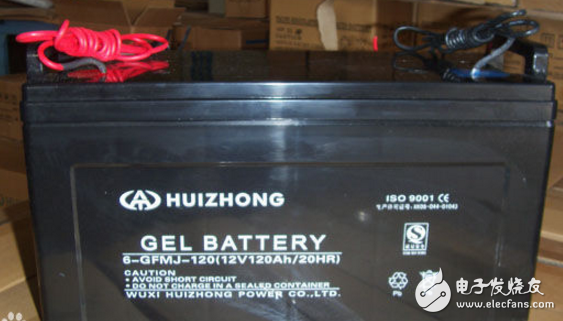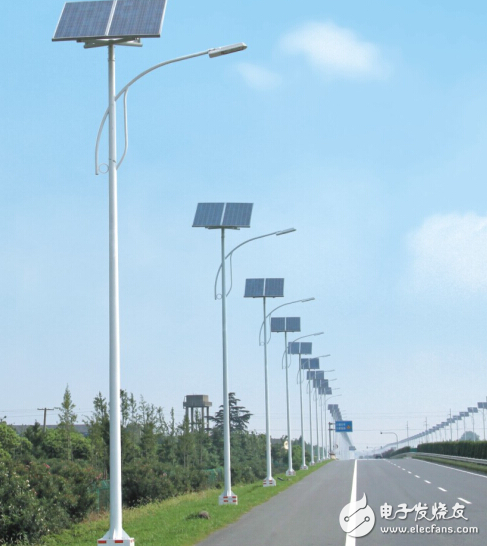
Privacy statement: Your privacy is very important to Us. Our company promises not to disclose your personal information to any external company with out your explicit permission.

When it comes to solar street lights, I believe that everyone is very familiar with them. In the lighting of various public places such as urban lighting, street lighting, residential lighting, factory lighting, and scenic lighting, solar street lights play a very important role. Solar street light uses natural sunlight as a new energy source for lighting. It has the advantages of energy saving, environmental protection, simple installation and beautiful appearance. It has been widely used in various industries.
The solar street lamp battery is the application of the battery in the solar street lamp. The solar street lamp battery is used to store the electric energy generated by the solar cell module, and another new energy street lamp when the illumination is insufficient or illuminated at night.
Sealed lead-acid batteries, ordinary lead-acid batteries, gel batteries, lithium-iron batteries and alkaline nickel-cadmium batteries, etc., the voltage is generally 12V or 24V.
However, the most commonly used are sealed lead-acid batteries and colloidal batteries, which are widely used because of their maintenance-free and high environmental protection.
For solar street light batteries, there should be: enough cycles of charge and discharge, low self-discharge rate, long service life, strong deep discharge capability, high charging efficiency, and low maintenance or maintenance-free.

The solar street lamp battery configuration calculation method is as follows:
One: First calculate the current:Such as: 12V battery system;
2 lamps of 30W, a total of 60 watts.
Current = 60W ÷ 12V = 5A
For example, the cumulative lighting time of street lamps needs to be 7 hours (h) at full load;
(If it is open at 8:00 in the evening, 1 in the night at 11:30, 2 in the morning at 4:30, and closed at 5:30 in the morning)
Need to meet the lighting needs of 5 days in continuous rainy days. (5 days plus one night before the rainy days, 6 days)
Battery = 5A × 7h × (5 + 1) days = 5A × 42h = 210AH
In addition, in order to prevent overcharging and overdischarging of the battery, the battery is generally charged to about 90%; the remaining discharge is about 20%.
So 210AH is only about 70% of the real standard in the application.
The battery of the solar street lamp is generally placed in the buried box as the energy storage component in the solar street lamp system, and the buried box is generally placed in the concrete pool built beside the pole, and the battery and the need to do well The steps of heat preservation and gas diffusion and waterproofing are very important. Nowadays, maintenance-free batteries are generally used, which are basically maintenance-free and convenient. There are also some southern solar street lights that can also be placed in a specially welded battery box at the bottom of the pole. Disassembly is convenient but has an impact on battery life under high temperature conditions.

In general, the battery for solar street lights is buried underground. But do you know why the solar street light battery is buried underground? What is the role of buried in the ground?
1. There is a reason to bury underground for theft prevention. Because streetlight batteries are more expensive, they attract some thieves. From this perspective, we certainly can't be buried too shallow, which will undoubtedly provide convenience for thieves.
2. Prevent water from entering the battery. Although there are waterproof measures on the outside of the battery, in order to further waterproof, we can't bury too shallow. Generally speaking, it can be well waterproofed at 1 meter.
3, antifreeze. The main reason for antifreeze is because it will reduce the battery life in extremely cold conditions. Therefore, if the place where the solar street light is installed is in the colder north, it is necessary to bury the battery in the depth of 2 meters.
The solar street light system can guarantee normal work in rainy weather for more than 15 days! Its system consists of LED light source (including drive), solar panels, battery (including battery incubator), solar street light controller, street light pole (including foundation) and auxiliary wire.
Solar cell modules generally use monocrystalline silicon or polycrystalline silicon solar cell modules; LED lamp heads generally use high-power LED light sources; controllers are generally placed in the light poles, with light control, time control, overcharge and over discharge protection and reverse connection protection, The advanced controller has four seasons to adjust the lighting time function, half power function, intelligent charging and discharging function, etc.; the battery is generally placed underground or there will be a special battery incubator, which can be a valve-regulated lead-acid battery or a gel battery. Iron-aluminum battery or lithium battery. The solar luminaire works fully automatically and does not require trench wiring, but the pole needs to be mounted on the embedded part (concrete base).
1. High luminous efficiency, low power consumption, long service life and low working temperature.
2. Strong safety and reliability.
3. The reaction speed is fast, the unit volume is small, and the environment is green.
4. Under the same brightness, the power consumption is one tenth of the incandescent lamp, one third of the fluorescent lamp, and the life is 50 times that of the incandescent lamp, and 20 times of the fluorescent lamp, after the incandescent lamp, the fluorescent lamp and the gas discharge lamp. The fourth generation of lighting products.
5. The advent of a single high-power ultra-bright LED is possible in the LED application field to the high-efficiency lighting source market. It will be one of the greatest inventions after humans invented incandescent lamps.
In order to get as much solar radiation as possible for a solar module in a year, we need to choose the best tilt angle for the solar module.
Discussions on the optimal tilt angle of solar modules are used in different regions depending on the region.
In solar street lighting systems, one of the structural issues that needs to be taken seriously is the wind-resistant design. The wind-resistant design is mainly divided into two large blocks, one is the wind-resistant design of the battery assembly bracket, and the other is the wind-resistant design of the light pole. The following two pieces are separately analyzed.
According to the technical parameters of the battery component manufacturer, the solar cell module can withstand a wind pressure of 2700 Pa. If the wind resistance coefficient is selected to be 27 m/s (equivalent to ten typhoons), according to the non-viscous fluid mechanics, the wind pressure of the battery assembly is only 365 Pa. Therefore, the assembly itself is fully capable of withstanding wind speeds of 27 m/s without damage. Therefore, the key consideration in the design is the connection of the battery assembly bracket to the pole.
In the design of the lamp set system, the connection between the battery assembly bracket and the lamp post is fixedly connected by using a bolt rod.
The parameters of the street light are as follows:
Battery board inclination A=16o pole height=5m
Design selection of the bottom of the lamp post weld width δ = 4mm lamp pole bottom outer diameter = 168mm
The surface of the weld is the damage surface of the pole. The distance from the calculation point P of the lamp-bar damage surface to the resistance moment W to the action line F of the panel subjected to the lamp rod is
PQ=[5000+(168+6)/tan16o]×Sin16o=1545mm=1.545m. Therefore, the moment of action of the wind load on the failure surface of the lamp post is M = F × 1.545.
According to the maximum allowable wind speed of 27m/s design, the basic load of the 2×30W double-lamp solar street light panel is 730N. Consider the safety factor of 1.3, F = 1.3 × 730 = 949N.
Therefore, M = F × 1.545 = 949 × 1.545 = 1466 N.m.
According to mathematical derivation, the resistance moment of the toroidal failure surface is W = π × (3r2δ + 3rδ2 + δ3).
In the above formula, r is the inner diameter of the ring, and δ is the width of the ring.
Destructive surface resistance moment W=π×(3r2δ+3rδ2+δ3)
=π×(3×842×4+3×84×42+43)=88768mm3
=88.768×10-6m3
Stress caused by moment of action of wind load on the failure surface = M/W
=1466/(88.768×10-6)=16.5×106pa=16.5Mpa“215Mpa
Among them, 215Mpa is the bending strength of Q235 steel.
Therefore, the width of the weld selected by the design meets the requirements, as long as the welding quality can be guaranteed, the wind resistance of the pole is no problem.
The main function of the solar charge and discharge controller is to protect the battery. The basic functions must have overcharge protection, over discharge protection, light control, time control, anti-reverse connection, charging turbulence protection, under voltage protection, and waterproof protection.
In the selection of devices, there are currently using single-chip microcomputers, and there are also comparators. There are many schemes, each with its own characteristics and advantages. The corresponding scheme should be selected according to the customer's demand characteristics, which will not be detailed here.
This series of products adopts new electrostatic coating technology, mainly based on FP professional building materials coatings, which can meet customers' requirements for product surface color and environment coordination. At the same time, the products have high self-cleaning property, strong corrosion resistance and aging resistance. Climate environment. The processing technology is designed to be coated on the basis of hot dip galvanizing, which greatly improves the performance of the product and meets the requirements of the most stringent AAMA2605.2005. Other indicators have met or exceeded the relevant requirements of GB.
When the WOSEN solar panel charges the battery, if the battery reaches the peak voltage, if the high voltage charging continues, the battery may lose water or run out of control; if the battery is stopped, the battery cannot be saturated. This controller is stepped down by 1V immediately after charging to the peak voltage, and then enters the trickle charge state, ensuring that the battery can be stabilized in a full state, while avoiding water loss or loss of control, similar to circulating the battery, not only efficient The battery is protected, and the number of times the battery is charged is increased, and the service life is longer.
The above content is provided by WOSEN. WOSEN is a professional manufacturer and supplier of Led Flood Light, Led Street Light, Led Solar Light, etc. For more information, please visit https://www.wosenled.com/ or contact admin@wosenled.com or WhatsApp +86-13425434349
November 04, 2024
November 04, 2024
November 12, 2024
November 11, 2024
이 업체에게 이메일로 보내기
November 04, 2024
November 04, 2024
November 12, 2024
November 11, 2024

Privacy statement: Your privacy is very important to Us. Our company promises not to disclose your personal information to any external company with out your explicit permission.

Fill in more information so that we can get in touch with you faster
Privacy statement: Your privacy is very important to Us. Our company promises not to disclose your personal information to any external company with out your explicit permission.